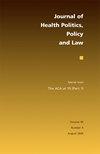State Policies and Health Disparities between Transgender and Cisgender Adults: Considerations and Challenges Using Population-Based Survey Data.
IF 3.3
3区 医学
Q1 HEALTH CARE SCIENCES & SERVICES
引用次数: 5
Abstract
CONTEXT This study examined the association between state-level policy protections (e.g., inclusive of hate crimes, employment, housing, education, and/or public accommodations) and self-rated health disparities between transgender and cisgender adults. METHODS We used data on transgender (n=4,982) and cisgender (n=1,168,859) adults from the 2014-2019 Behavioral Risk Factor Surveillance System. We estimated state-specific health disparities between transgender and cisgender adults. Multivariable logistic regression models were used to compare adjusted odds ratios (aOR) between transgender and cisgender adults by state-level policy environments. FINDINGS Overall, transgender adults were significantly (p<0.05) more likely to report poor/fair health (aOR=1.26; 95% CI=1.18-1.36), frequent mental distress (aOR=1.79; 95% CI=1.67-1.93), and frequent poor physical health days (aOR=1.26; 1.16-1.36) than cisgender adults. Disparities between transgender and cisgender adults were found in states with strengthened protections and in states with limited protections. Compared to transgender adults in states with limited protections, transgender adults in states with strengthened protections were marginally (p<0.10) less likely to report frequent mental distress (aOR=0.33; 95% CI=0.11-1.05). CONCLUSIONS Transgender adults in most states reported worse self-rated health than their cisgender peers. Much more research and robust data collection on gender identity are critically needed to study the associations between state policies and transgender health and to identify best practices for achieving health equity for transgender Americans.跨性别和顺性成年人之间的国家政策和健康差异:使用基于人口的调查数据的考虑和挑战。
本研究考察了州一级的政策保护(例如,包括仇恨犯罪、就业、住房、教育和/或公共设施)与跨性别和易性成年人之间自评的健康差异之间的关系。方法使用2014-2019年行为风险因素监测系统中跨性别(n=4,982)和顺性别(n=1,168,859)成年人的数据。我们估计了跨性别和顺性别成年人在各州的健康差异。采用多变量logistic回归模型比较跨性别和顺性成年人在国家政策环境下的调整优势比(aOR)。总体而言,跨性别成人报告健康状况不佳/一般的可能性显著(p<0.05)更高(aOR=1.26;95% CI=1.18-1.36),频繁精神困扰(aOR=1.79;95% CI=1.67-1.93),经常出现身体健康状况不佳的日子(aOR=1.26;1.16-1.36)高于顺性别成人。在保护措施加强的州和保护措施有限的州,变性人和顺性人之间存在差异。与保护有限的州的跨性别成年人相比,保护加强的州的跨性别成年人报告频繁精神困扰的可能性略低(p<0.10) (aOR=0.33;95% CI = 0.11 - -1.05)。结论大多数州的跨性别成年人自评健康状况较顺性别同龄人差。迫切需要对性别认同进行更多的研究和收集强有力的数据,以研究州政策与跨性别者健康之间的关系,并确定实现跨性别美国人健康平等的最佳做法。
本文章由计算机程序翻译,如有差异,请以英文原文为准。
求助全文
约1分钟内获得全文
求助全文
来源期刊
CiteScore
7.30
自引率
7.10%
发文量
46
审稿时长
>12 weeks
期刊介绍:
A leading journal in its field, and the primary source of communication across the many disciplines it serves, the Journal of Health Politics, Policy and Law focuses on the initiation, formulation, and implementation of health policy and analyzes the relations between government and health—past, present, and future.

 求助内容:
求助内容: 应助结果提醒方式:
应助结果提醒方式:


